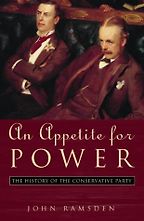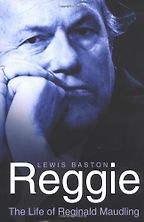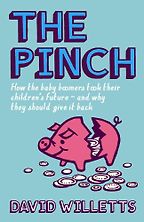You begin with a book on the history of the Conservative Party.
Yes, let’s start with An Appetite for Power by John Ramsden. Actually, this one book is acting as a substitute for six. Longman has produced a fabulous history of the Conservative Party in six volumes, of which John Ramsden wrote three; and An Appetite for Power is a single volume drawn from that. The series is a stunningly detailed history, which starts with constituency organisation and the power structure inside the Conservative Party and moves on to ideas. As the Conservative Party is primarily an organisational rather than an ideological body, that is a very good way of studying it.
Ramsden’s title, An Appetite for Power, reflects what he regards as the one consistent characteristic of Conservative organisation: an instinct for what people believe and a willingness to adapt to it; and he says the Conservative Party has done that over and over again, never remained adhering to some strict ideology for very long periods of time. And I think that’s a very adept reading of the Party, and one that is particularly interesting now. It was written during the long years of opposition before David Cameron became leader. John Ramsden recently died but he anticipated absolutely what the Conservative Party has now done. The Labour Party showed that kind of appetite for power under Tony Blair but normally Labour is much more ideological.
So, the idea which has gained currency, that Cameron sat down and studied the New Labour manual to modernise his party, is all very well but, in fact, the Conservative Party repeatedly adapts to gain power?
Exactly. A very important part of understanding David Cameron is that he is part of a very recognisable Conservative tradition of adaptability. He also owes quite a lot to what we might call a myth of Disraeli, which is the idea that the Conservative Party became a party of the people with Disraeli. Actually, Disraeli wasn’t quite that populist, a social Conservative. There has been that strand of populism in the party’s history but it was more important in the myth created about the Conservative Party. It wasn’t really about Disraeli in practice. That’s brought out very well in Ramsden’s book.
Your next choice is The Great Melody by Conor Cruise O’Brien.
Every Conservative has to read Edmund Burke, and, in particular, the Reflections on the French Revolution, a timeless and brilliant statement of Conservative ideas. Conor Cruise O’Brien has produced a book that is simultaneously an anthology of Burke and a biography. It was a simply brilliant idea. So much of Conservatism is not abstract, so to try to separate ideas from context or biography never quite works. What Conor Cruise O’Brien has done here is reconnect the two. There are brilliantly chosen selections from Burke’s major works, for example, the Reflections, his letter to the electors of Bristol, his impeachment of Warren Hastings.
What Conor Cruise O’Brien tries to do is to explain what appears at first to be an odd difference, which is that Burke was a supporter of the American Revolution, having been an opponent of the French Revolution. I believe that almost all of Conservatism can be understood by saying that there’s a difference between the American Revolution and the French one.
The difference is between attempting to assert democratic rights and limit the power of government within an evolving system versus attempting to achieve the overthrow of all institutions and the entire class structure using blood. Burke predicted not only what happened in the French Revolution but what has happened over and over again in different revolutions of the similar kind. You could just as easily have his ‘Reflections on the Cultural Revolution in China’, for example.
So I think Burke is unmissable and particularly in this form.
You said it’s not helpful to divide the ideas from the context but is that unique to Conservatism? Is it ever a good idea?
One of the reasons why there is no such thing as a single international conservatism is because conservatism is so rooted in the institutions and values of particular places, in preserving them, in trying to understand the essence of a nation. And the essence of nations is different. So Republicanism in America and Conservatism in Britain will be different; and they reflect their nations; they are trying to preserve and advance vastly different things.
So you can see that Nixon’s cloth-coat Republicanism, for example, might be very different from contemporaneous Conservatives in the UK, reflecting more support for the royal family. And Newt Gingrich’s revolution, and the anti-Washington sentiment, has echoes in British Conservatism but it’s not the same because Britain isn’t the same. It doesn’t have a government like Washington and it doesn’t have a federal system. So Conservatives here have often employed quite centralising policies, whereas in America they are for States’ rights.
Your next book is very British.
I have deliberately chosen to be a bit arcane with my third book: Reggie by Lewis Baston. If you want to realise how conservative movements all over the world are exceptionalist in the same way that Republicans believe in American exceptionalism, then nothing could be better than reading histories of obscure British politicians. This is a book about Reginald Maudling, who was a very senior politician, singularly undynamic – so much so that when punched by a Member of Parliament over Bloody Sunday [the shooting in Northern Ireland of protesters by members of the British forces] because he was Home Secretary at the time, somebody shouted, ‘My God! She’s woken him up!’
This is a biography that takes you right into the heart of 1950s Conservatism in the same way that Robert Caro’s life of Lyndon Johnson takes you right into the Senate of the same period – it is very difficult to do if you live in another country but very important to understanding something as nationally individualist as conservatism.
Maudling was twice a contender for leader of the Party, once in a very serious way, and he lost because really, although he was thought to be the finest politician, he was thought to be too lazy. He then ran to seed, and ended up having to resign because of his relationship with a corrupt architect called John Poulson. And I think that Lewis Baston makes it pretty clear that Maudling’s business relationships were corrupt, I suppose in the way that Caro does with Johnson as well.
Maudling therefore emerges as a bit of a wasted talent. But, on the other hand, he does reflect the kind of solid centre of Conservatism that wouldn’t be familiar to an American audience in the way that Margaret Thatcher is. It was the Conservatism that preceded her, the equivalent of Eisenhower conservatism. I also recommend it as a wonderful book of British history and it’s very well-written.
When Jim Callaghan, later the Labour Prime Minister, took over from him as Chancellor of the Exchequer in 1964, Maudling, as he was leaving, popped his head around the door and said, ‘Sorry to have left it all in such a mess, old cock.’ And Callaghan thought he meant his office, but he meant the national finances.
Shades of Liam Byrne. On to your fourth book, The Pinch by David Willetts.
This book has only just been written and therefore can’t be described as being in the pantheon of Conservative classics. But, as a modern policy book, it’s hard to beat. It’s an absolutely brilliant book. His basic theory is that all policy questions should be considered through the generational filter: that means booms and busts of population are absolutely critical, that the ties between generations are critical. His views on the ties between the generations are what make this a distinctly Conservative book.
I think David Willetts is by far the most considerable Conservative political writer; and I don’t mean he is the most considerable Conservative writing today, I mean it in absolute terms, full stop. He is always interesting and he has read massive amounts of social research. He has inserted sociology into Conservative thinking.
What he’s done in this book is a tour de force of that kind of thinking. He was the first to understand and explain the importance of the family. Now he has explained the importance of generational shifts, of generational equality, of generational obligations. He gives a startlingly original explanation for our problems with saving and debt and some very good modern ways of illustrating how things like the baby boom have influenced social policy. I recommend it because it’s an illustration of very smart, non-ideological thinking that proceeds from an understanding of how society is rather than from how society should be.
You seem to imply that seeing things as they are rather than as we would wish them to be is a Conservative virtue. Do you believe this is a uniquely Conservative starting point?
Yes I do. Willetts does write about what he thinks should happen but he starts with where society is. It becomes more and more clear to me that the whole of democratic socialism was an intellectual error. I don’t mean that believing in greater social equality or wanting to eradicate injustice was an error. Rather, there was a particular democratic socialist idea, which was that it would be possible to control and organise the world. This was based on a fundamental misunderstanding about how complicated the world is. It didn’t proceed from how the world is, but from a misunderstanding of reality. Whereas what David tries to do is to rely on research about how people actually live their lives, what their first relationships really are; and it’s not theoretical, it’s based on social research. I also use this book to stand for something else – that Conservatives are increasingly turning to evolutionary psychology. Human behaviour and instinct is what it is, so then you have to do what you can to change it or change social arrangements to work around it. It’s not very likely to me that we are the one species that didn’t evolve and whose behaviour is not basically evolutionary in origin.
But our ability to adapt, our primary characteristic as the most successful species, gives us the ability to go beyond those instincts and behaviours.
Of course. But one of the things in evolutionary psychology which is very important for politics is the understanding of the origins of altruism. What’s very important about this book is that Willetts is trying to find a Conservative theory of fairness rooted in the question of what we actually regard as fair, not what somebody else happens to decree we should regard as fair. Our altruism is based on a desire to reciprocate other people’s favours. We know that’s a good way of surviving, so we try to reciprocate other people’s favours and hope they reciprocate ours. This has a good consequence, which is altruism towards others who are not our family; the bad consequence is we tend to look for other people who are like us and we tend to co-operate with them. So it can lead to tribalism but it can also lead to social cohesion.
Nobody who understands evolutionary psychology should go from that to believing, for example, that because women and men are different that either are superior or inferior to the others. But the starting point in discussions of fairness should be who we are and what we are, whatever that might be. All of that discussion is reflected in The Pinch.
Is this the key question for British Conservatives at this political moment, to formulate their own version of fairness? It’s appealing as the next stage of trying to abandon the ‘nasty party’ image.
I think a Conservative idea of fairness is very important. Clearly, every community’s idea of what’s fair will differ, but a sense of justice and an appeal to fairness should be central. You have to have a language in which to talk about fairness and I think it has been a weakness of Conservative thinking that we haven’t had that. And so people like David are trying to redress that imbalance.
Your final choice is back to history.
I’ve chosen a book about Richard Oastler, who was a radical figure in the late 1700s and early 1800s. He was a Conservative and that’s why the book is called Tory Radical. He was one of the driving forces behind the Factory Acts. One of the central events in British history, in my view, took place in 1832 in Leeds during the election in which the forces supporting the Great Reform Act were celebrating the fact that the Bill had been passed. Meanwhile, the Tory radicals were out on the street protesting about the failure to improve factory conditions, and these supporters of what later became Lord Shaftesbury’s reforms and the supporters of the Great Reform Bill had a stand-up fight in the streets of Leeds. I think this is absolutely fascinating.
The funniest thing is that Oastler has ended up having his statue erected outside the shopping centre in Bradford, when he was against markets and consumerism.
Poor chap.
This book gives you an insight into the complicated history of early Conservatism and how Conservatives have always formed different coalitions. In this case it was the coalition between the factory workers and the aristocrats against the mill-owners – the mill-owners being the Liberals. The paper that supported the Factory Acts was The Times and the paper that opposed the Factory Acts was The Manchester Guardian because The Manchester Guardian supported the new rising classes.
There is a leftist history of progress in which the left have been in favour of all the good stuff and the Tories were against it all. Actually, history has been much more complicated than that, and very often – as in the case of the abolition of slavery, the Factory Acts and votes for women as well – those things were introduced by the Conservatives. Universal women’s suffrage was introduced by the Conservative Party.
Refusing women’s suffrage was not the Liberal Party’s finest hour.
It is fascinating because the reason why the Liberal Party, and Labour too although not Keir Hardie, opposed votes for women was because they didn’t want a load of middle-class women voting – because they had a class view rather than a view across society. The Conservative Party has often been characterised as the party of suburban women: in fact, it is the case that the Conservative Party has never won an election in which it did not get more votes from women than men. Emmeline Pankhurst, of course, ended her life as the Tory candidate for Bethnal Green.
At times the Conservative Party has pragmatically supported reforms because of the alliances that it has formed. So this alliance David Cameron has now formed with the Liberal Democrats is not an unusual feature of Conservative history. Conservatives made a common cause with even the most radical elements against the mill-owning classes partly because they thought it was their social responsibility, partly because of the importance of the evangelical church – which has recently also risen again in importance in the conservative parties across the world.
Five Books aims to keep its book recommendations and interviews up to date. If you are the interviewee and would like to update your choice of books (or even just what you say about them) please email us at [email protected]
Five Books interviews are expensive to produce. If you've enjoyed this interview, please support us by donating a small amount.










